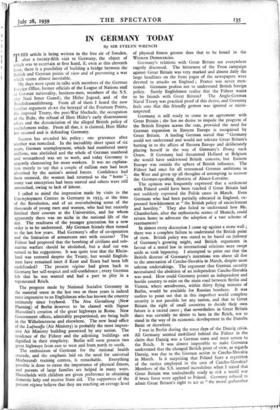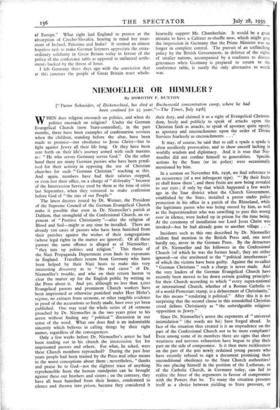IN GERMANY TODAY
By SIR EVELYN WRENCH
ri HIS article is being written in the free air of Sweden, 1 after a twenty-fifth visit to Germany, the object of which was to ascertain at first hand, if, even at this eleventh hour, there is a possibility of building a bridge between the British and German points of view and of preventing a war which seems almost inevitable.
My days were spent in talks with members of the German Foreign Office, former officials of the League of Nations staff of Get man nationality, business-men, members of the S.S. (the Nazi Inner Guard), the Hitler Jugend, and of the Reichsfrauenfiihrung. From all of them I heard the now familiar argument abut the betrayal of the Fourteen Points, the imposed Treaty, the post-War blockade, the occupation of the Ruhr, the refusal of Herr Hitler's early disarmament offers and the denunciation of the alleged British policy of encirclement today. From all that, ir is claimed, Herr Hitler has rescued and is defending Germany.
Success has attended his policy ; one grievance after another was remedied. In the incredibly short space of six years, German unemployment, which had numbered many millions, was abolished and the whole of German manhood and womanhood was set to work, and today Germany is urgently clamouring for more workers. It was no explana- tion merely to say that a couple of million men had been absorbed by the nation's armed forces. Confidence had been restored, the women had returned to the " home "; many vast enterprises had been started and others were still untouched, owing to lack of labour.
I called to mind the impression made by visits to the Unemployment Centres in Germany in 1933, at the time of the Revolution, and of an overwhelming sense of the thousands of young men and women, who had but recently finished their courses at the Universities, and for whom apparently there was no niche in the national life of the day. The readiness of the younger generation for a new order is to be understood. My German friends• then turned to the last few years. Had Germany's offer of co-operation and the limitation of armaments met with success? The Fiihrer had proposed that the bombing of civilians and sub- marine warfare should be abolished, but a deaf ear was turned to his suggestions. It was quite true that the Rhein- land was restored despite the Treaty, but would English- men have remained inert if Kent and Essex had been left undefended? The present regime had given back to Germany her self-respect and self-confidence ; every German felt that he was wanted and had a part to play in a regenerated Reich.
The progress made by National Socialist Germany in the material sense in the last two or three years is indeed most impressive to an Englishman who has known the country intimately since toyhood. The Neu Gestaltung (New Planning) of Berlin deserves to be classed with Signor Mussolini's creation of the great highways in Rome. New Government offices, admirably proportioned, are being built in the Wilhehnstrasse and elsewhere. The new head office of the Luftwaffe (Air Ministry) is probably the most impres- sive Air Ministry building possessed by any nation. The residence of the Fiihrer and the adjoining buildings are dignified in their simplicity. Berlin will soon possess two great highways from east to west and from north to south.
The enthusiasm of Germans for the national health crusade, and the emphasis laid on the need for universal Mothercraft training centres, is remarkable. Everything Possible is done to stress the importance of physical fitness, and parents of large families are helped in many ways. Households with children are given preference in obtaining domestic help and receive State aid_ The supporters of the present regime believe that they are reaching an average level of physical fitness greater than that to be found in the Western Democracies.
Germany's relations with Great Britain are everywhere eagerly discussed. The bitterness of the Press campaign against Great Britain was very marked and almost daily the large headlines on the front pages of the newspapers were devoted to attacks on England ; France was never men- tioned. Germans profess not to understand British foreign policy. Surely Englishmen realise that the Fiihrer wants to be friends with Great Britain? The Anglo-German Naval Treaty was practical proof of this desire, and Germany feels sore that this friendly gesture was ignored or misin- terpreted.
Germany is still ready to come to an agreement with Great Britain ; she has no desire to impede the progress of the British Empire across the seas, provided the need for German expansion in Eastern Europe is recognised by Great Britain. A leading German stated that "Germany could not understand and would not tolerate Great Britain's butting in to the affairs of Eastern Europe and deliberately placing herself in the way of Germany's Drang nach Osten. If Germany had threatened Holland or Belgium she would have understood British concern, but Eastern Europe was outside the sphere of British influence. The Fiihrer had once for all renounced German ambitions in the West and given up all thoughts of attempting to recover the German-speaking districts of Alsace-Lorraine.
The opinion was frequently expressed that a settlement with Poland could have been reached if Great Britain had not suddenly espoused the Polish cause in March. Even Germans who had been partially educated in England, ex- pressed bewilderment at "the British policy of encirclement and hostility." They also failed to understand how Mr. Chamberlain, after the enthusiastic scenes of Munich, could return home to advocate the adoption of a vast scheme of rearmament!
In almost every discussion I came up against a stone wall ; there was a complete failure to understand the British point of view. British policy was stated to be based on jealousy of Germany's growing might, and British arguments in favour of a moral law in international relations were swept aside as rank hypocrisy. I attempted to point out that the British distrust of Germany's intentions was above all due to the annexation of Czecho-Slovakia in March, despite most solemn undertakings. The argument that German security necessitated the abolition of an independent Czecho-Slovakia was used. How could Germany permit an independent and hostile country to exist on the main road between Berlin and Vienna, where aerodromes, within thirty flying minutes of Berlin, would be available for Russian bombers. It was useless to point out that in this imperfect world complete security is not possible for any nation, and that to Great Britain the right of small countries to decide their own future is a sacred cause ; that nevertheless in Great Britain there was certainly no desire to hem in the Reich, nor to stand in the way of its economic development in the Danube Basin or elsewhere.
I was in Berlin during the tense days of the Danzig crisis. All Germany seemed mobilised behind the Fiihrer in the claim that Danzig was a German town and must return to the Reich. It was almost impossible to make Germans understand that the changed British point of view, as regards Danzig, was due to the German action in Czecho-Slovakia in March. Is it surprising that Poland fears a repetition of the tactics employed in the case of Czecho-Slovakia? Members of the S.S. seemed incredulous when I stated that Great Britain was undoubtedly ready to risk a world war if brute force were applied to Poland. Germany refused to admit Great Britain's right to act as "the moral godmother of Europe." What right had England to protest at the absorption of Czecho-Slovakia, bearing in mind her treat- ment of Ireland, Palestine and India? It seemed an almost hopeless task to make German listeners appreciate the extra- ordinary solidarity in Great Britain today in favour of the policy of the confcrence table as opposed to unilateral settle- ments backed by the threat of force.
I left Germany three days ago with the conviction that at this juncture the people of Great Britain must whole- heartedly support Mr. Chamberlain. It would be a great mistake to have a Cabinet re-shuffle now, which might give the impression in Germany that the Prime Minister was no longer in complete control. The pursuit of an unflinching policy by the British Government, in defence of the rights of smaller nations, accompanied by a readiness to discuss grievances when Germany is prepared to return to the conference table, is surely the only alternative to world war.









































 Previous page
Previous page